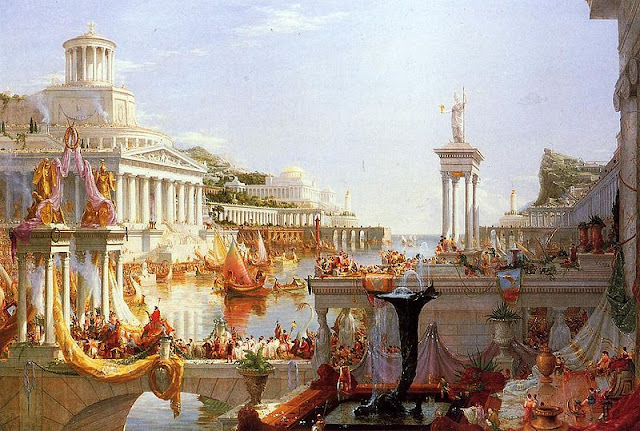 |
| The Course of Empire: Destruction by Thomas Cole |
I'm not usually a big fan of organ music but this toccata by
Johann Pachelbel is beautiful and it's fun to watch the organists fingers fly as he plays this complicated piece.
http://www.youtube.com/watch?v=qGL4Q6qv6Dk
Another poem this week by Thomas Miller, Spring Walk. Those of you who enjoy nature walks will appreciate this poem.
THOMAS MILLER
England, 1807-1874
The Spring Walk
We had a pleasant walk to-day
Over the meadows and far away,
Across the bridge by the water-mill,
By the woodside and up the hill;
And if you listen to what I say,5
I'll tell you what we saw to-day.
Amid a hedge, where the first leaves
Were peeping from their sheathes so sly,
We saw four eggs within a nest,
And they were blue as a summer sky.10
An elder branch dipped in the brook;
We wondered why it moved, and found
A silken-haired smooth water-rat
Nibbling, and swimming round and round.
Where daisies open'd to the sun,15
[19]In a broad meadow, green and white,
The lambs were racing eagerly—
We never saw a prettier sight.
We saw upon the shady banks
Long rows of golden flowers shine,
And first mistook for buttercups 5
The star-shaped yellow celandine.
Anemones and primroses,
And the blue violets of spring,
We found, while listening by a hedge
To hear a merry plowman sing. 10
And from the earth the plow turned up
There came a sweet, refreshing smell,
Such as the lily of the vale
Sends forth from many a woodland dell.
And leaning from the old stone bridge, 15
Below, we saw our shadows lie;
And through the gloomy arches watched
The swift and fearless swallows fly.
We heard the speckle-breasted lark
[20]As it sang somewhere out of sight, 20
And tried to find it, but the sky
Was filled with clouds of dazzling light.
We saw young rabbits near the woods
And heard the pheasant's wings go "whir";
And then we saw a squirrel leap 5
From an old oak tree to a fir.
We came back by the village fields,
A pleasant walk it was across 'em,
For all behind the houses lay
The orchards red and white with blossom. 10
Were I to tell you all we saw,
I'm sure that it would take me hours;
For the whole landscape was alive
With bees, and birds, and buds, and flowers.
Over the meadows and far away,
Across the bridge by the water-mill,
By the woodside and up the hill;
And if you listen to what I say,5
I'll tell you what we saw to-day.
Amid a hedge, where the first leaves
Were peeping from their sheathes so sly,
We saw four eggs within a nest,
And they were blue as a summer sky.10
An elder branch dipped in the brook;
We wondered why it moved, and found
A silken-haired smooth water-rat
Nibbling, and swimming round and round.
Where daisies open'd to the sun,15
[19]In a broad meadow, green and white,
The lambs were racing eagerly—
We never saw a prettier sight.
We saw upon the shady banks
Long rows of golden flowers shine,
And first mistook for buttercups 5
The star-shaped yellow celandine.
Anemones and primroses,
And the blue violets of spring,
We found, while listening by a hedge
To hear a merry plowman sing. 10
And from the earth the plow turned up
There came a sweet, refreshing smell,
Such as the lily of the vale
Sends forth from many a woodland dell.
And leaning from the old stone bridge, 15
Below, we saw our shadows lie;
And through the gloomy arches watched
The swift and fearless swallows fly.
We heard the speckle-breasted lark
[20]As it sang somewhere out of sight, 20
And tried to find it, but the sky
Was filled with clouds of dazzling light.
We saw young rabbits near the woods
And heard the pheasant's wings go "whir";
And then we saw a squirrel leap 5
From an old oak tree to a fir.
We came back by the village fields,
A pleasant walk it was across 'em,
For all behind the houses lay
The orchards red and white with blossom. 10
Were I to tell you all we saw,
I'm sure that it would take me hours;
For the whole landscape was alive
With bees, and birds, and buds, and flowers.


